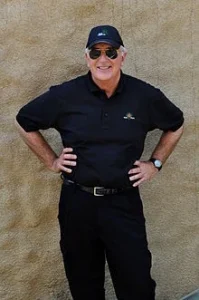The Joe Rogan Experience #1901 – Joe Rogan & Steven Pressfield
The Joe Rogan Experience is a podcast hosted by American comedian, presenter, and UFC color commentator Joe Rogan. It launched on December 24, 2009, on YouTube by Rogan and comedian Brian Redban, who was its sole co-host and producer until 2012 when Jamie Vernon was hired to co-produce. Vernon would eventually take over production. By 2015, it was one of the world’s most popular podcasts, regularly receiving millions of views per episode, also including a wide array of guests, including business magnate Elon Musk, whistleblower Edward Snowden, and Senator Bernie Sanders.

Steven Pressfield
Steven Pressfield is an American author of historical fiction, non-fiction, and screenplays, including his 1995 novel The Legend of Bagger Vance and 2002 non-fiction book The War of Art. Pressfield's first book, The Legend of Bagger Vance, which was loosely based on the Bhagavad Gita, was published in 1995, and was made into a 2000 film of the same name directed by Robert Redford and starring Will Smith, Charlize Theron, and Matt Damon. His second novel, Gates of Fire (1998), is about the Spartans and the battle at Thermopylae. It is taught at the U.S. Military Academy, the United States Naval Academy, and the Marine Corps Basic School at Quantico.
Books Mentioned on The Joe Rogan Experience (JRE) #1901 - Joe Rogan & Steven Pressfield:
Joe Rogan & Steven Pressfield - Delving into the Depths of Procrastination
In a recent episode of The Joe Rogan Experience, Joe sat down with acclaimed author Steven Pressfield for a deep dive into a universal challenge: procrastination. While many perceive procrastination as a mere delay in tasks, Pressfield posits that it’s intricately tied to one’s ego. Their conversation unravels the many layers of procrastination, shedding light on its universality and the shared narratives that hold us back.
The Universal Nature of Procrastination
It’s a common assumption that procrastination is a personalized vice, unique to each individual. Yet, as Pressfield astutely observes, almost everyone seems to wrestle with it in strikingly similar ways. Whether it’s the self-deprecating script of “you’re not worthy” or the myriad of other reasons like being “too old, too young, too fat, or too thin,” these internal narratives are almost universal. Such shared experiences suggest that procrastination’s roots may be deeper than mere laziness or lack of motivation.
Procrastination: A Force of Nature
One of the most compelling insights from the conversation is the idea of procrastination as a force of nature. It’s not just a personal challenge or a quirk of character; it’s a universal phenomenon that affects almost everyone. The voice of procrastination, while sounding personal and hitting one’s vulnerabilities, isn’t unique to any individual. Recognizing this can be liberating. By understanding that this force isn’t solely targeting them, individuals can better equip themselves to combat its effects and push through the barriers it erects.
Conclusion
Procrastination, as Steven Pressfield elucidates, is more than just a delay in action. It’s a complex interplay of ego, internal narratives, and universal experiences. The conversation between Joe Rogan and Steven Pressfield serves as a timely reminder of the shared challenges we face and the importance of understanding the deeper forces at play. As we navigate our daily tasks and ambitions, recognizing procrastination for what it truly is can be the first step in overcoming it.














